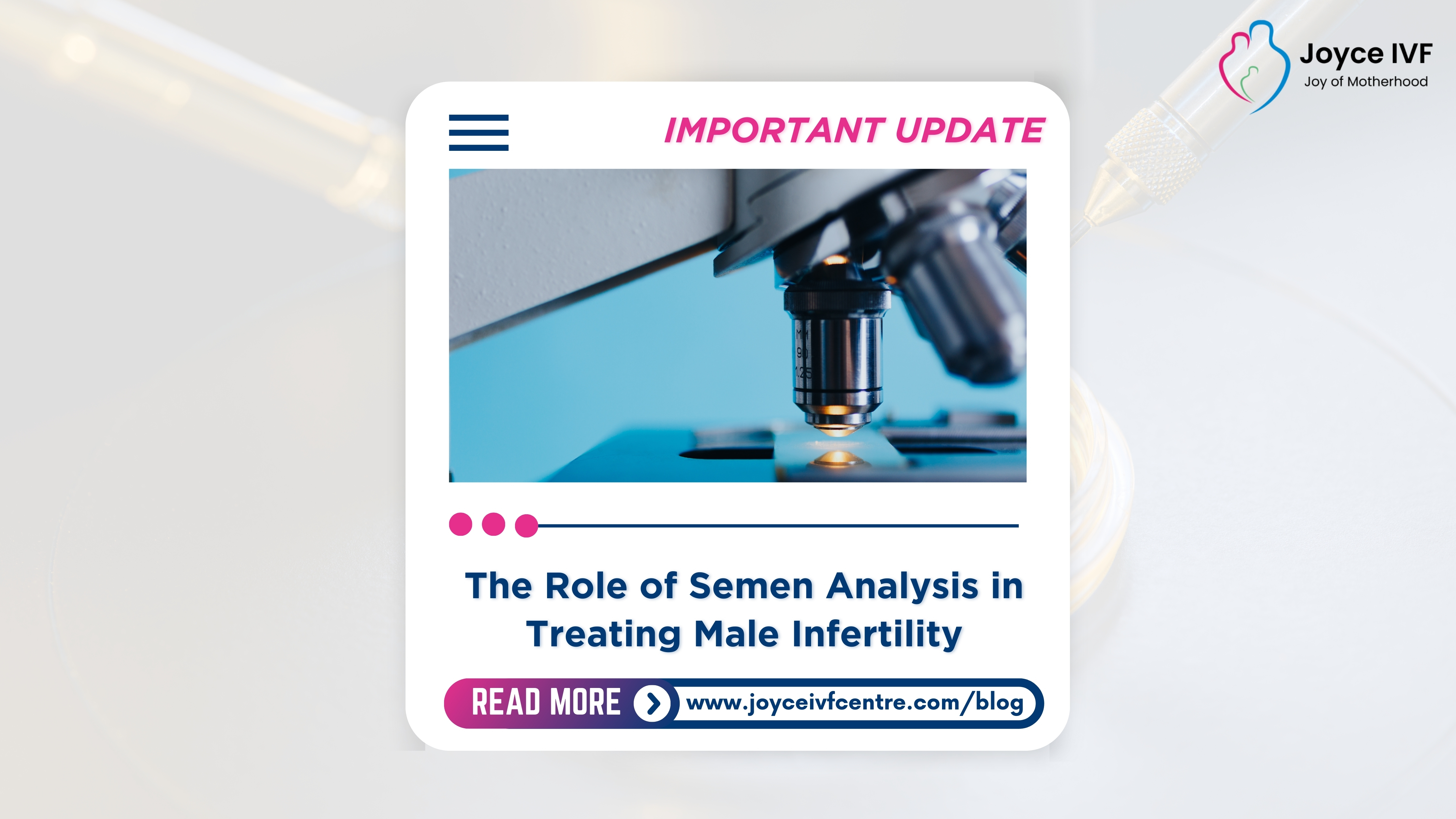Male infertility is a condition that affects many couples struggling to conceive. While the focus has historically been on female fertility, male infertility is responsible for approximately 40-50% of all infertility cases. In recent years, semen analysis has become one of the primary diagnostic tools in assessing male fertility. This simple but crucial test provides important insights into the health and viability of a man’s sperm, helping fertility specialists determine the underlying causes of infertility and tailor treatment plans accordingly.
In this blog, we’ll explore the role of semen analysis in treating male infertility, the process involved, and how it can guide treatments such as IVF (In Vitro Fertilization) and other assisted reproductive technologies. We’ll also provide useful information for those seeking the best IVF centre in Srinagar or the best IVF centre in Delhi.
What is Semen Analysis?
Semen analysis is a laboratory test that evaluates the quantity, quality, and overall health of a man’s semen and sperm. It is typically one of the first tests performed when male infertility is suspected. The test examines several factors related to sperm, including:
- Sperm Count (Concentration): This refers to the number of sperm in a given sample of semen. A healthy sperm count is typically over 15 million sperm per milliliter of semen.
- Sperm Motility (Movement): This measures how well the sperm move. Healthy sperm should swim in a forward direction, which is essential for reaching and fertilizing the egg.
- Sperm Morphology: This assesses the shape and size of sperm. Abnormalities in sperm morphology can affect the sperm’s ability to fertilize an egg.
- Semen Volume: This refers to the total amount of semen in the sample. A low semen volume could indicate potential issues with the seminal vesicles or prostate.
- pH Level: The pH of semen is another indicator of fertility health. Healthy semen typically has a slightly alkaline pH.
- White Blood Cells: The presence of white blood cells in semen could indicate infection or inflammation.
- Fructose Levels: Fructose is a sugar found in semen that provides energy for sperm. Low fructose levels may indicate issues with the seminal vesicles.
A semen analysis provides a comprehensive understanding of sperm health, which can guide treatment options. In many cases, if abnormalities are found, further tests and consultations with fertility specialists are recommended.
Why is Semen Analysis Important for Male Infertility?
Semen analysis is critical in diagnosing male infertility because it directly provides data about the sperm’s ability to fertilize an egg. Male infertility can result from a variety of factors, including:
- Low Sperm Count (Oligospermia): A low number of sperm in the semen can reduce the chances of successful fertilization.
- Poor Sperm Motility (Asthenozoospermia): Even with a healthy sperm count, if the sperm cannot swim properly, they may not reach the egg.
- Abnormal Sperm Morphology (Teratozoospermia): If sperm have irregular shapes, they may not be able to penetrate the egg, which is crucial for conception.
- Varicocele: A condition where veins in the scrotum become enlarged, affecting sperm production.
- Infections: Infections in the reproductive tract can reduce sperm quality.
- Hormonal Imbalances: Issues with hormone levels can directly impact sperm production.
By analyzing the sperm and semen parameters, semen analysis helps pinpoint the cause of infertility, allowing doctors to propose appropriate treatments or lifestyle changes.
The Process of Semen Analysis
The process of semen analysis is straightforward and non-invasive. Here’s what to expect:
- Collection: The man provides a semen sample, typically through masturbation, in a private collection room at a fertility clinic or lab. It’s important to abstain from ejaculation for 2-3 days before the test for accurate results.
- Lab Analysis: The semen sample is then taken to a laboratory, where it is analyzed for sperm count, motility, morphology, and other factors mentioned earlier.
- Results: Once the analysis is complete, the results are shared with the couple. If the sperm count or other parameters are low, further testing or treatments may be recommended.
It’s important to note that semen analysis results can vary, and a single abnormal test doesn’t necessarily mean infertility. Repeated tests are often recommended for a more accurate diagnosis.
How Semen Analysis Guides Treatment for Male Infertility
Based on the results of a semen analysis, fertility specialists can recommend several treatments for male infertility, including:
- Lifestyle Modifications: Factors like smoking, alcohol consumption, poor diet, and excessive stress can affect sperm health. In some cases, improving lifestyle habits may be enough to improve sperm count and motility.
- Medications: Hormonal treatments or medications can be prescribed to correct imbalances, treat infections, or improve sperm production.
- Surgical Interventions: If varicocele, blockages, or other structural issues are found, surgery may be required to correct the problem.
- Assisted Reproductive Technologies (ART): If semen analysis reveals severe abnormalities, IVF (In Vitro Fertilization) or ICSI (Intracytoplasmic Sperm Injection) may be suggested. ICSI, in particular, is useful in cases where sperm motility or morphology is a concern, as it involves injecting a single sperm directly into an egg.
IVF Centres in Srinagar and Delhi
If you are seeking fertility treatment in India, there are many reputable IVF centres in Srinagar and Delhi that can help diagnose and treat male infertility. These centres are equipped with state-of-the-art technology and offer a range of services, including semen analysis, IVF, ICSI, and other ART treatments.
- IVF Centre in Srinagar: Couples in Srinagar seeking fertility solutions can find experienced specialists who offer semen analysis and personalized treatment options. Clinics in the region provide advanced ART techniques and fertility preservation services, ensuring that all aspects of male and female infertility are addressed.
- Best IVF Centre in Delhi: Delhi boasts some of the best IVF centres in the country, with experienced doctors and advanced fertility technologies. These centres provide comprehensive diagnostic tests, including semen analysis, and offer a wide range of fertility treatments, including IVF, ICSI, and sperm donation.
Both of these cities have highly rated fertility clinics, but it’s crucial to research and select a clinic that offers personalized care and proven results. Look for centres with high success rates and a reputation for providing compassionate support through the fertility journey.
Frequently Asked Questions (FAQs)
- How accurate is semen analysis? Semen analysis is generally accurate, but results can vary from one test to another. A single abnormal test doesn’t necessarily indicate infertility, and repeat testing may be needed for a conclusive diagnosis.
- Can male infertility be treated with medications? Yes, in some cases, medications can help treat male infertility by addressing hormonal imbalances or infections. Your doctor will recommend the best treatment based on your semen analysis results.
- Is sperm count the only factor in male infertility? No, sperm motility and morphology also play significant roles. A low sperm count alone doesn’t always result in infertility, but poor sperm movement or abnormal shapes can hinder fertilization.
- What is ICSI, and when is it used? ICSI (Intracytoplasmic Sperm Injection) is an advanced fertility treatment used in IVF, where a single sperm is directly injected into an egg. It is often used when sperm quality is low, such as in cases of poor motility or abnormal morphology.
- How often should a semen analysis be done? A semen analysis is typically performed once or twice before determining the treatment plan. However, multiple tests may be necessary to confirm the results, especially if the first test shows abnormalities.
Conclusion
Semen analysis plays a crucial role in diagnosing male infertility and is often the first step in identifying the causes of fertility issues. It provides vital information about sperm health, which can guide treatment decisions, whether through lifestyle changes, medication, or assisted reproductive technologies like IVF. If you are struggling with infertility, consult with a fertility specialist to explore your options and learn more about the latest treatments available.
If you’re looking for quality care, don’t hesitate to visit a trusted IVF centre in Srinagar or the best IVF centre in Delhi for expert advice and support.
























